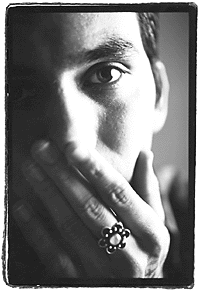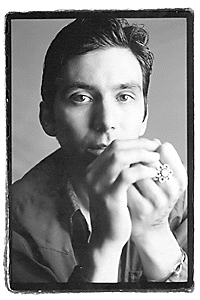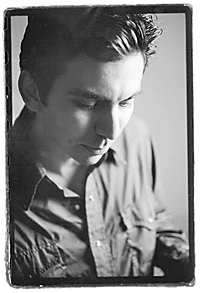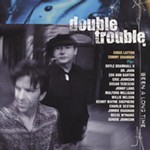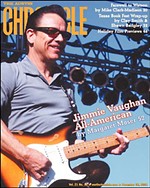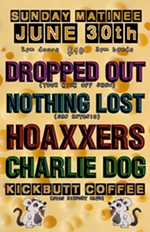Musical Manifesto
Davíd Garza's
By Andy Langer, Fri., April 3, 1998
|
|
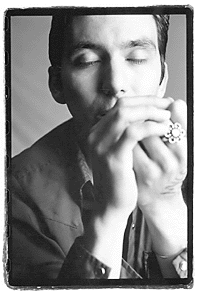 |
|
photographs by Todd V. Wolfson |
In just over eight years of living and playing in Austin, Davíd Garza has followed the music down some fairly diverse paths. Between his tenure with local sensations Twang Twang Shock-A-Boom, Garza's first band and still perhaps his most successful (in terms of hype anyway), and next week's release of his Lava/Atlantic major label debut, This Euphoria, the philosophizing Garza has been many things: teen sensation, struggling singer-songwriter, fraternity favorite, road warrior, independent record mogul, home studio wizard, and Time/Warner associate.
To hear his detractors tell it, all these paths have most often rendered Garza directionless, causing him to be insincere, egocentric, and most often, pretentious. In fact, although he and Alejandro Escovedo share both a Hispanic heritage and a thirst for constant reinvention, Garza has mostly been greeted by the locals as the anti-Alejandro; perhaps no local musician has taken on as many challenging personas and gotten more bad press and general resentment for their efforts.
"Austin's special for me," says Garza, "because I don't think I'll ever be respected here. And there's a comfort in that. If I go on to sell X number of records, they'll say I got lucky or Atlantic bought it for me. That's because Austin has known me since I was a dork singing about fishsticks with Twang Twang. How could I be about anything else to them?"
By all accounts, the party least concerned with Garza's local reputation is Lava, a small Atlantic Records imprint with a lot of corporate clout. After a bidding war, Lava signed Garza in 1996, licensing his homespun label Wide Open Records in the process. Yet because Lava's four-person staff spent most of 1997 milking multi-platinum debuts from Sugar Ray and Matchbox 20, they asked Garza to wait his turn in the pipeline, delaying the release of his debut and throwing him a juicy bone instead - the opportunity to place a song on the Great Expectations soundtrack. Better yet, Lava consented to Garza's releasing a homemade EP, The 4-Track Manifesto, which came out late last fall on the musician's Wide Open imprint.
Not only did the EP's rough edges and anthemic songwriting help reposition Garza musically just in time for his proper national debut, it also made valuable inroads at college radio and retail. Actually, the same could be said about the EP's impact on Atlantic, where label brass were so impressed with The 4-Track Manifesto that they urged Garza to add two of the EP's tunes, "Float Away" and "Discoball World," onto This Euphoria, declaring the latter tune the album's first single. Back in Austin, meanwhile, the EP's local promotion was intentionally low-key, though having to go to Austin's grocery stores to find a copy seemed a little out of the ordinary.
"I go to Central Market or H.E.B. and run into cashiers and bread aisle shoppers who look at me and say, `Dude, you lost it. What are you thinking?'" says Garza. "I've taken to carrying [The 4-Track Manifesto] in my bag to give them away. It's like, `Here, I know you haven't listened to me in five years. Take it, free.' Then maybe those people will start coming to the gigs."
Although the success of Twang Twang and the many years Garza has put into developing a local audience might suggest larger local crowds, the singer's post-Twang Twang gigs have traditionally catered to just 350 people. And not just the same 350 people, either; every time Garza has re-invented himself musically, he's pulled in a different 350 people. Perhaps it isn't so that Garza's fans are disloyal as it is a case of them being ultra-loyal to whatever the local musician is at any given moment, abandoning him when he changes musical styles. Most recently, Garza earned dozens of angry e-mails for doing a short regional tour with a DJ, a musical vehicle he thought would best convey The 4-Track Manifesto's spacey, lo-fi textures.
"I've always alienated as many people as I bring in," admits Garza. "I run into people all the time who say, `I used to go see you a lot and then you started doing that weird shit,' or `I used to go see you a lot and then you stopped doing this.' Just recently, at my last two Stubb's gigs, I know I lost people because I didn't play any acoustic guitar.
"Then again, there are new people who come because they happened to be at Stubb's that night and liked what they saw. You can never underestimate that. As soon as you stop thinking there will be turnover, you're dead."
Like a politician who clearly cares about the opinion polls, but maintains he doesn't use them to develop policy or vote, Garza claims his musical vision is immune to and unguided by critics or alienated fans - admitting freely that if this weren't true, he'd probably be a lot more popular. Nonetheless, the criticism clearly fascinates and consumes Garza, perhaps because he was raised by a critic.
"My mother raised five kids and was both an artist and a singer," explains Garza. "As a strong Mexican/Catholic woman, she was also a critic, so I got to see the artist and the critic function as one person very early in life. In fact, I made some music early on and had my mother saying, `I don't like that.' Then she'd turn around and say, `I like that.' I got used to the dual role. She was always my biggest fan and biggest critic."
Mrs. Garza's first stabs at music criticism came while living in Irving, Texas; she sent her children to a Catholic elementary school in Oak Cliff, Dallas' most ethnically diverse neighborhood. At school, Garza studied classical music and jazz guitar, educating himself on the finer points of commercial radio and MTV at the same time. By 1988, Garza was competing in high school band contests with musicians who would later become Garza's local musical peers: Elias Haslanger, Freddy Mendoza, Jeff Haley, and Chris Searles. It was around this same time that Garza found himself entertaining a scholarship offer from the University of Texas, which just happened to be located in the city that launched two of his musical and personal heroes, Stevie Ray Vaughan and Charlie Sexton. All Garza had to do was fake his School of Music audition.
"They asked me to prepare a classical guitar piece, so I learned it from the radio," says Garza. "I played it so convincingly, they assumed I could read music. The first day of class, my professor sat down a piece of music in front of me and I stumbled though it. He said, `So, you can play, but you can't read. You're one of those jungle types.' I think he thought I was one of those indigenous Mexican types, whatever that means."
His music teacher's original intent aside, Garza's early frustrations with UT's School of Music helped fuel his interest in finding an extra-curricular project. In fact, later that same day - his first - Garza ran into Searles and Haley in the department's lobby. That was September 18, 1989. Twang Twang Shock-A-Boom's first gig was three days later. Their unamplified guitar/stand-up bass/drums setup moved from the School of Music to the West Mall a week later.
"Every Thursday, we'd sit on the West Mall with my classical guitar case and get enough money to go to Conan's [Pizza]," recalls Garza. "In that sense, there was no pressure. We were just thrilled to eat free once a week. But I took it pretty seriously, because it was the first time I was writing songs. I'd never sang or written lyrics before. I was just playing these little guitar parts and making up words to keep people's attention, because when we started it was just this jazzy pop crap."
Crap or not, the Cactus Cafe's proprietor, Griff Luneburg, saw the crowds Twang Twang was attracting just outside his Union-situated live music venue, so he invited Garza and company inside. Once the trio of college students outgrew the Cactus, the Texas Tavern (just next door) and Liberty Lunch made similar offers. As it winds up, promoting those gigs was as simple as maintaining Twang Twang's Thursday residency on the West Mall.
"We realized the free West Mall shows were our fliers for the clubs gigs," explains Garza. "But it was never premeditated. We didn't think, `This is the "Live Music Capital of the World" - we can make a living at this.' It's just that we were doing something; it's not what we did, just the fact that we did anything. That's what punk is - doing something. We weren't the New York Dolls by any stretch, but we were who we were and it was do-it-yourself. We were three fresh-faced suburban dudes who dug Conan's, grew up playing jazz and Mexican music, knew the value of a pop song, and wanted people to dance. That was our own version of punk."
Garza's other punk idea was to break up the band after just 13 months and three full-length cassettes. In his mind, the casual West Mall approach had been tainted by the growing interest from local radio, press, and major labels. Worse still, Garza maintains that people began expecting the trio to perform at Liberty Lunch or with the Red Hot Chili Peppers at RiverFest while re-creating the West Mall vibe.
"We couldn't do those gigs unamplified on huge stages and get it to translate," says Garza. "Everybody else thought it did, because it was a cute gimmicky thing. Then we went up to New York for record deals and people wanted us to do fishsticks commercials and be Mrs. Paul's band. We said no, because my ego told me to leave. Fine, I have a huge ego. It told me I was better than fishsticks commercials. At least I admit it. Yeah, I'm a jerk because I won't let people tell me what to do - not even my good buddies in the band. And everybody always hates the guy that quits the band."
In time, they came to hate Garza's post-Twang band even more. Within a month of Twang Twang's break-up, Garza performed his first shows with his new group, named "the Love Beads" because the Chronicle's Ken Leick wrote the first thing he could get to rhyme with Dah-veed in his "Dancing About Architecture" column. Musically, Dah-veed fed off what Garza felt Twang Twang lacked, electricity.
"Twang Twang was an acoustic thing, but I saw how electricity could ignite people. People like JJ Cale and Jimmie Vaughan were doing with electric instruments what I thought couldn't be done - touch people's hearts. And I figured why waste time? I saw what I needed to do, and since I'm a big goal guy with a very short attention span I knew I needed to get an electric rock band.
"I grew up listening to the radio and watching the Stray Cats, Blondie, Slayer, and Quiet Riot. All of that made sense as a whole, so it became no problem for me to strap on an acoustic and go to the West Mall, or strap on an electric with Billy White's Marshall rig and start that up. It was no big deal. Only everybody hated it..."
Clearly, different people hated Garza for different reasons. Maybe that he had learned to write and sing in public and at this point was still only 18 didn't help; certainly a glut of sappy love songs sung by a teenager didn't. Nor did the fact that many within the local music scene believed Garza was changing his name from David to Dah-veed (the Spanish pronunciation of Davíd) as some sort of ego stroke. Garza says he never considered it a big deal, but in fact, even a recent Houston Press story used the name change as proof that Garza too often gets "hung up on minor, egocentric details."
"My mother and grandmother have called me Davíd since the day I was born," says Garza, seriously. "I was born Davíd. If people think it's an egotistical quirk to go by my God-given Mexican-American name, fuck you. Period. Being Mexican is about your heart, your values, what's in your blood, and it's about respect. I don't want to be lumped in with the people named David. I'm Davíd. And I'm not named Garcia, I'm named Garza - there's a difference. And if you're a Mexican in Texas you know there's a fuckin' difference. Sure, it's a proud Chicano thing, but I'd rather be called egocentric, then say, `Sure, you can call me Dave.'"
Even beyond the name issue, however, there may be yet another culture clash contributing to Garza's local bad rap - his obvious ambition and Austin's reputation for a lack thereof. Before Garza signed with Atlantic, he had already self-released five CDs and three cassettes on Wide Open. Their combined sales? Over 30,000 copies. At the same time, Garza took his act where he was better appreciated - on the road. Less than a year after Twang Twang had broken up, Garza was already cultivating a regional base that included stops in Dallas, Denton, Waco, Ft. Worth, San Marcos, Nacogdoches, San Antonio, Corpus Christi, Lubbock, and El Paso. Teaming up with other regional acts like Better Than Ezra, Little Sister, and Jackopierce, Garza's fan base soon stretched well across the Southwest.
"When we came out with Twang Twang, the backbone of Austin music was slow and steady, like, `We're playing the blues, just rockin' and rollin'.' And I think some people were put off by a young guy trying to do more. But I always felt the best way to promote yourself is to strap on a guitar, plug it in, and set up a microphone. It's not interview press, radio, or the Internet. So I made all those records as an excuse to tour. I didn't tour because I made records. It was kind of backwards. Either way, if you don't take the business seriously, people won't listen to the music seriously."
Twang Twang may have had record deals on the table, but for all of Garza's post-Twang business savvy, he never seemed capable of convincing major labels to bring the pen and paper back out. After five South by Southwest showcases yielded no takers, Garza says he stopped treating them like make-or-break affairs, and approached his 1995 showcase without a setlist. That, of course, was the year he got signed.
In what has since become one of SXSW's great fairytale discoveries, the wife of producer David "Stiff" Johnson (G. Love, Cypress Hill) kneeled down to tie her shoe in front of Steamboat and liked the music she heard coming out of the Sixth Street club enough to coax her and her husband inside. After the gig, Johnson and Garza traded numbers, which led to the pair meeting later in Philadelphia to record a demo. While the local musician's lawyer shopped those recordings (a nearly year-long process), Garza toured with Better Than Ezra and began a stint with Blind Melon that lasted exactly one gig (the night Shannon Hoon died). Afterwards, he reunited Twang Twang for a series of local shows, a new cassette, and a tour. When he returned, he found a full-fledged bidding war for his services.
"It was all very odd," he says, "because it was the first time in five years somebody other than me or a few fans really cared what I was doing. Every time I released a record, I'd send it to label people, but they never called back saying it was amazing. Nobody ever said, `It's incredible you got to make two records with Craig Ross.' They said, `Who?' And then when all the labels got interested, I thought maybe I could really, really do this - not just for myself, but for the music. And that's what money can do; I can hire a road manager and all those other people to do the business so I can still pretend it's 1988 and I'm writing songs at [UT's] Taos Co-Op. That's what I'm trying to accomplish."
|
|
"I can sign you drinking coffee and make a record out of it," says Garza. "It would be dumb and a detriment to my career, but just knowing I have that freedom means a lot."
That freedom has come into play a great deal over the past six months as delays in the release of This Euphoria allowed Garza to tinker endlessly with the album. In fact, by all accounts, This Euphoria is a drastically different album than what Garza planned to release last August. And not only has the majority of the album been remixed over the last year - The 4-Track Manifesto tunes added as well - Garza was busy making last-minute changes right up until his February 30 deadline. Subsequently, This Euphoria has been remixed and resequenced so many times that Garza is already talking about eventually putting out the original album on Wide Open, because it's so different than what Atlantic is releasing.
"This whole record making process has been such a weird thing," says Garza. "People think I've turned into this strange obsessive guy taking so long in the studio, but I'm not. This is what happens when you join a corporation, let alone one as big as Time Warner. As beautiful and lovely as they may have been to me, I have to fit into their agenda and work for them. And I'm excited to work for them, because I believe in them and they believe in me. It's good, because they've become fans while this time has passed. They let the songs become part of their lives. I have people at Atlantic come up and say, `My wife loves this song,' or `My kid loves that song.' You don't have that when you give them a demo and six weeks later there's a record out."
Better yet, there's no question that Atlantic is excited about This Euphoria. Not only are radio programmers nationwide suggesting to the label's promotions department that "Discoball World" is a hit-in-waiting, there's also 11 other songs that could change Garza's critical reception. Not only are they all crisp, three-minute pop songs, the hardest rockers ("Kinder") and smartest ballads ("I Know") spill over with crossover potential; for proof, look at the diversity of Garza's three most recent touring partners - Matchbox 20, Ani DiFranco and Ben Harper. And even if Garza's debut were to get off to a slow commercial start, by his spending the last year meeting and endearing himself to everyone up and down the Atlantic chain of command, he has virtually guaranteed himself a long-term commitment. Sounds like a lot of schmoozing for a guy with no expectations.
"You can make the machine work for your music," asserts Garza. "I'm schmoozing and shaking hands, because I'm the embodiment of the music, not my manager or lawyer. I go and shake these hands, and that's the difference. Most people go and make their managers shake hands and then you get treated like a product. But if you go in person to the West Coast or to the other branch offices and sit with them and give them an hour of your time, it means something to them. Then the reward is that much greater, because it's going to be real, not a fluke. If I fail, it's because I didn't do the right thing, not because my manager or label didn't do the right thing.
"And you can't depend on your booking agent, lawyer, or manager to get everything for you. You have to hustle. You have a product - like a used car salesman. But if what you're selling is your spirit and the music, then it's a lot easier to get up and go to work, to make all those calls. And as long as you can still write and record the way you want, it's worth it."
If all goes according to plan, it will be more than a year before Garza gets another serious chance to write and record. And while he's admittedly nervous about Atlantic's machinery spinning too fast, or the idea of spending too long between records, Garza says yes, all he can do is follow the music.
"If I sell a million records or sell five and get dropped that's what the music wanted me to do," says Garza, flatly. "I'm a big believer in fate. What matters right now is that I take things slow; that when I start a song, I start it at the right tempo and sing it the right way, because there's nothing anybody can say or control about that. Live music is the sanctuary and always should be. And I think people forget that just because you're part of the machinery, you can still do the music the way you want. If you forget to start the song at the right speed or turn your amp the right way because you're too busy bemoaning the fact that you didn't get a "Recommended" in the Seattle newspaper or that there's 30 people instead of 300, you stop doing the music justice. I think I can rise above that...
"If at 17 somebody had told me you're going to be 27 when your debut comes out on Atlantic Records, I would have been disappointed. But I couldn't be more ecstatic about the fact they waited for me. I'm glad. Who knows, maybe I'm still not ready, but I sure do feel a lot more ready than I was at 17."
If Garza is indeed ready and Atlantic's machine is equally ready, wouldn't it then make for the biggest "I told you so" in Austin music history?
"For me, the real definition of an egocentric pretentious jerk is someone who says, `I told you so.' If people thought I was a joke before, for me to say, `Ha! Ha!' is me being a jerk. I don't want the last laugh. I just want to keep being able to do this."





